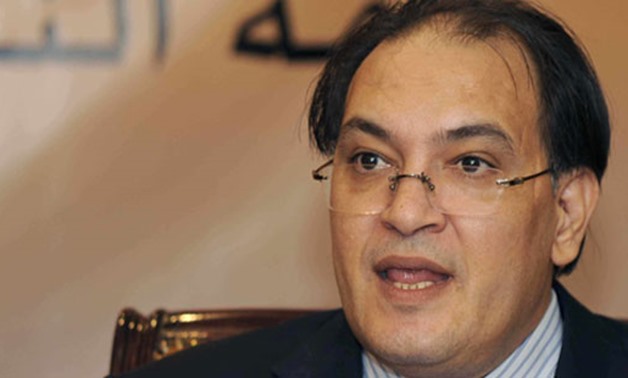
Hafez Abu Seada, Egyptian human rights activist and Chairman of the Egyptian Organization for Human Rights (EOHR) - press photo
CAIRO - 18 September 2018: Hafez Abu Seada, Egyptian human rights activist and Chairman of the Egyptian Organization for Human Rights (EOHR), met Monday with Mohamed Ali Alnsour, Chief of Middle East and North Africa Office of the High Commissioner of Human Rights (OHCHR) and representatives of Qatar’s Al Ghofran clan at the OHCHR’s headquarters in Geneva.
The EOHR organized the meeting to give the chance for the Qatari clan to present their case to the international organizations. Abu Seada announced his organization’s total solidarity with the case of Al Ghofran clan, whose members were subjected to some of the "worst forms of human rights violations for over 20 years."
According to the EOHR, Qatari authorities have, since 1995, pursued a policy of collective punishment against the tribe of Ghofran that entailed the revoking of the nationality of more than 6,000 of its tribesmen, many of who were expelled from the country after their property and personal funds were confiscated.
"It is noteworthy that the tribe of Al Ghofran belongs to the tribe of Bani Mura, which make up about 40 percent of the people of Qatar making them indigenous to this country," the EOHR explained, adding that it has decided to adopt their cause for several reasons, including the international community’s and human rights organisations’ overlooking of this tragic issue and EOHR's belief in the universality of human rights principles and the need to establish and maintain them in the Arab region.
Al Ghofran representatives noted that from 1996 to 2004, the clan was "savagely subjected to the worst crimes of racial discrimination, forced displacement, denial of return to their homeland, imprisonment and acts of torture that led to psychological damage and death within the Qatari intelligence prisons.
The clansmen said that Qatari authorities, "ranging from the Emir of Qatar, the Prime Minister, the Attorney General, the President of the National Committee for Human Rights, senior security officials and dignitaries," are fully aware of the discrimination against members of Al Ghofran clan, and that these senior officials "are deeply involved" in these criminal acts.
In reaction to the Al Ghufran tribe’s opposition to the Qatari regime’s destabilising policies in the region and its dispute with the neighbouring Gulf states, Qatari authorities revoked the citizenship of Sheikh Taleb Bin Lahom Bin Shreim in August. It did the same for 54 members of his family who belong to the Al Murrah tribe in a step considered to be an arbitrary act by various Human Rights organisations.
The Qatari tribe Al Ghufran declared that 6,000 of its members were forcibly displaced after the Qatari government deprived them of their Qatari nationality and their national rights.

Emir of Qatar Sheikh Tamim bin Hamad al Than
Qatar's Emir Sheikh Tamim bin Hamad al Thani has stripped the nationality of some Qatari tribal leaders and frozen the assets of others, including Sheikh Sultan; Sheikh Talib bin Mohamed Bin Lahoum Bin Sherim, leader of Al-Murra tribe; and Sheikh Abdullah bin Ali Al-Thani, a member of the Qatari royal family.
Qatari opposition members have taken further steps to voice their concerns and show their refusal of the Qatari regime’s policies with its neighboring Arab countries. Opposing voices to Qatari regime have even grown at home.
About a year ago, Qatar was hit by its biggest diplomatic crisis after multiple Arab nations, including Egypt, Saudi Arabia, the UAE and Bahrain cut ties with Qatar, accusing it of destabilizing the region with its support for Islamist groups.
The Arab quartet halted all land, air and sea traffic with Qatar, and withdrew their diplomats and ambassadors from the Qatari peninsula. The Arab quartet issued 13 demands to Doha – then shortened to six principles - including closing Al Jazeera television, curbing relations with Iran and shutting down a Turkish military base.
The four Arab countries severed relations with Doha over what they say was its close links to Iran, which has been accused of interfering in Arab countries’ affairs and being behind terrorist plots. Doha restored full diplomatic relations with Tehran amid the crisis.
One major disagreement between Qatar and its neighbors has been the former’s support for the Muslim Brotherhood, which has been outlawed as a terrorist group by the boycotting countries.
Since the eruption of the crisis, Qatar showed no intention of solving the strife. However, Qatar placed several people and entities on its terrorism list in March, including several Qatari nationals already blacklisted by the Arab quartet that accused Doha of supporting militants. Qatar’s issuance of a terror list of 19 individuals and eight entities has done little to impress decision-makers in the four Arab countries.


Comments
Leave a Comment